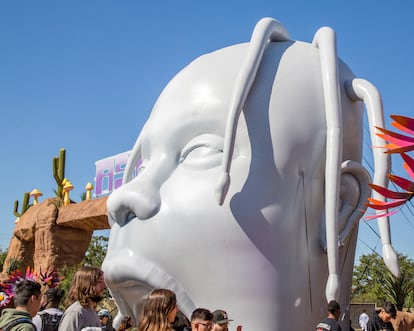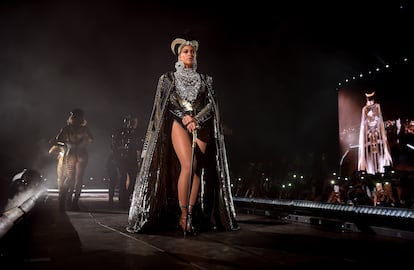Travis Scott’s ‘strange rituals,’ or why the Egyptians don’t want a Black artist performing in front of their pyramids
The American rapper was set to present his new album, ‘Utopia,’ on July 28 at one of the Seven Wonders of the World. Until the event was called off

The concert that Travis Scott had scheduled in front of the Giza pyramids for July 28 — one of the most anticipated of the year — was canceled due to the “strange rituals” that the rapper allegedly performs during his live performances and that go against “Egyptian and Arab customs and traditions.” This polemic has reignited the longstanding accusations of Satanism against Scott and brought attention to the Egyptian people’s discomfort at the frequent use of ancient Egyptian symbols by African-American artists.
Travis Scott is one of the most popular singers in the world. He has collaborated with several prominent artists such as Drake, Kanye West and Rosalía, and is the father of two children with model Kylie Jenner, the youngest of the Kardashian clan. The concert was supposed to be a chance for Scott to present his new album, Utopia, his first in five years, a launch around which Scott has generated great expectations: he just released K-POP, a first taste of the album, where he shares credits with Bad Bunny and The Weeknd. Prior to that, among other things, he painted a graffiti with the name of the album in Tarragona, Spain, which led some to speculate about a new collaboration with Rosalía.
The album is especially significant because it is also his first since the tragic incident that took place at the 2021 Astroworld Festival in Houston, Texas, where a crowd crush at the beginning of his performance resulted in the death of 10 people and left approximately 300 injured. Scott had a reputation for inciting mayhem during his presentations, and there were videos in which various attendees asked the rapper to stop the concert after several people had already died. Kylie Jenner, who was present at the event, explained that at the moment they were unaware of the seriousness of the situation. Despite this, more than 500 lawsuits were filed against Scott and the organizers of the festival. Last month, after months of police investigations, a Harris County grand jury decided not to indict Scott or the promoter.

Numerous conspiracy theories arose in the immediate aftermath of the Astroworld tragedy. Some, with no foundation at all, suggested that the incident had been the premeditated result of a “blood sacrifice” planned by the author of Sicko Mode. These theories quickly spread through social media, especially on TikTok, where certain videos reached tens of millions of views before being censored by the platform. The speculations were based on aspects such as the stage design, which a viral post on the Chinese social network interpreted as an inverted cross leading to a portal to hell. Others alluded to the entrance to Astroworld, which was shaped like Scott’s mouth and looked very similar to a figure that appears in the triptych of The Garden of Earthly Delights by the Dutch painter Hieronymus Bosch.
Strange rituals
Last Tuesday, the Egyptian Musicians’ Union suspended the license for Travis Scott’s concert. In a statement that was reproduced by local media, the organization refused to “tamper with societal values and Egyptian and Arab customs and traditions.” In addition, the union claims to have found “images and documented information on the strange rituals” that Scott allegedly practices at his concerts. This decision caused divided opinions in Egypt, with public figures such as singer Ahmed Saad and businessman Naguib Sawiris expressing their disagreement. Two days later, on July 26, Live Nation confirmed the cancellation of the event, after days of insisting that the concert would go on as planned.
Days before this announcement, an Egyptian news outlet reported about a social media campaign that demanded the cancellation of the American rapper’s concert. There are many Egyptians who are upset or uncomfortable with the cultural appropriation of their symbols by African-American performers. Beyoncé and Rihanna, for example, dressed as Nefertiti for a Coachella presentation and a cover of Vogue Arabia, respectively. Michael Jackson’s video of Remember the Time is set in a court of Ancient Egypt. Kanye West wore a pendant of the Egyptian god Horus to the 2011 BET Awards, which was similar to one that appears in the video for his song Power. Singer Janelle Monáe attended the Golden Globes dressed as Nefertiti. Rapper Nas released an album titled I Am, whose cover shows his face fused with that of Tutankhamen. Nina Simone incorporated the Egyptian aesthetic into her style for her album Fodder on My Wings, which features the silhouette of Nefertiti.

Afro-descendant singers and artists began to use elements of Egyptian iconography to reclaim the relevance of African history and culture. By promoting the idea that African history and culture are fundamental elements in the construction of human civilization, the Afrocentrist movement seeks to strengthen the identity of Afro-descendant communities around the world, a position that arises in response to Eurocentrism and other forms of cultural domination that have relegated and minimized the contribution of African and Afro-descendant cultures in world history.
In the particular case of Ancient Egypt, Afrocentrism argues that this civilization had strong African roots and that the ancient Egyptians maintained cultural ties with other African societies. Some thinkers of this current even suggest that some of the great figures of Ancient Egypt were Black. However, most Egyptians identify with an Arab or Mediterranean heritage, due to the Arab cultural influence in the region and the prevalence of this language as an official language. That is why they tend to reject the idea of a possible African origin for the Ancient Egyptian civilization.
The National Museum of Antiquities in Leiden, the Netherlands, came under fire for organizing an exhibition titled Kemet, Egypt in hip-hop, jazz, soul & funk, which evidenced the influence of Ancient Egypt on the music of the African diaspora and included images of Black artists portraying Ancient Egyptian rulers. The Egyptian Antiquities Service criticized the exhibition for its Afrocentric approach, calling it cultural appropriation; as a result, the museum was banned from continuing its excavations at the Saqqara necropolis near Cairo. This is just one conflict in a list of other similar ones, such as the choice of Black actress Adele James to play Queen Cleopatra in a Netflix docudrama.
There are more cases in the history of music where the use of symbolic elements from other cultures has caused cultural tensions. In 1966, for example, John Lennon said in an interview that The Beatles were “bigger than Jesus.” This statement provoked a strong backlash, particularly in the United States and other countries with Christian majorities; as part of the protests, in some places Beatles records were burned in public and several radio stations boycotted their music for a certain amount of time. Lennon’s comments even led to the cancellation of some concerts. Travis Scott has never stated an opinion on this controversy.
Sign up for our weekly newsletter to get more English-language news coverage from EL PAÍS USA Edition
Tu suscripción se está usando en otro dispositivo
¿Quieres añadir otro usuario a tu suscripción?
Si continúas leyendo en este dispositivo, no se podrá leer en el otro.
FlechaTu suscripción se está usando en otro dispositivo y solo puedes acceder a EL PAÍS desde un dispositivo a la vez.
Si quieres compartir tu cuenta, cambia tu suscripción a la modalidad Premium, así podrás añadir otro usuario. Cada uno accederá con su propia cuenta de email, lo que os permitirá personalizar vuestra experiencia en EL PAÍS.
¿Tienes una suscripción de empresa? Accede aquí para contratar más cuentas.
En el caso de no saber quién está usando tu cuenta, te recomendamos cambiar tu contraseña aquí.
Si decides continuar compartiendo tu cuenta, este mensaje se mostrará en tu dispositivo y en el de la otra persona que está usando tu cuenta de forma indefinida, afectando a tu experiencia de lectura. Puedes consultar aquí los términos y condiciones de la suscripción digital.









































